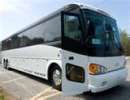
Senate Committee Advances CO Monitor, Bus Safety Bills
The U.S. Senate Committee on Commerce, Science, and Transportation moved two bills forward on Dec. 17 that will address carbon monoxide poisoning cases -- like home fires, they are a recognized winter danger -- and the safety of motorcoach operations.
The U.S. Senate Committee on Commerce, Science, and Transportation moved two bills forward on Dec. 17 that will address carbon monoxide poisoning cases -- like home fires, they are a recognized winter danger -- and the safety of motorcoach operations. Both bills had been introduced months earlier, and their companion bills in the U.S. House of Representatives have not advanced.
The CO bill is S. 1216, the Residential Carbon Monoxide Safety Act, would require the Consumer Product Safety Commission to adopt ANSI/UL 2034-2005, the American National Standard for Single and Multiple Station Carbon Monoxide Alarms, as a mandatory standard. It also would require CPSC to issue a final rule within 180 days of the bill's enactment into law that fulfills a pending rulemaking to require an automatic shut-off feature in portable generators if one is technologically feasible.
Manufacturers of residential CO detectors made more than a year after the date of the enactment of the law would have to clearly mark on the detector and its container that it conforms with the standard.
Also, the bill would direct CPSC to set up a grant program to help states carry out CO alarm programs. To be eligible for a grant, a state would have to have in place a law or rule mandating approved carbon monoxide alarms be installed in accordance with NFPA 720 in all commercial residential dwelling units and all new dwelling unit construction. A state receiving a grant could use the money to train fire code enforcement officers and to create training materials, hire instructors, and pay any other training cost associated with the program.
John Andres, engineering director for Kidde's Residential and Commercial Division of Mebane, N.C., testified Dec. 17 at a Senate Transportation subcommittee hearing that Kidde supports the bill. He said S. 1216 "would focus much-needed federal attention and resources toward ending accidental carbon monoxide poisoning" and added that the grant program is especially important. Twenty-three states have laws requiring CO alarms in residential dwellings, but states, consumers, and manufacturers need a consistent standard defining what constitutes an "approved" alarm, Andres said.
The motorcoach safety bill, S. 554, would require DOT to issue regulations mandating electronic on-board recorders, event data recorders, and seat belts in motorcoaches; advanced glazing in each portal to prevent passenger ejection, improved firefighting equipment; and enhanced compartmentalization safety countermeasures. It also calls for a training curriculum and certification for each driver of a motorcoach seeking a commercial driver's license passenger endorsement, improved CDL testing, and annual review of state licensing authorities to assess the accuracy of the physical examination reports and medical certificates of CDL applicants that are submitted to them by medical examiners. States would have to conduct an annual commercial motor vehicle inspection program to get a grant for these programs.